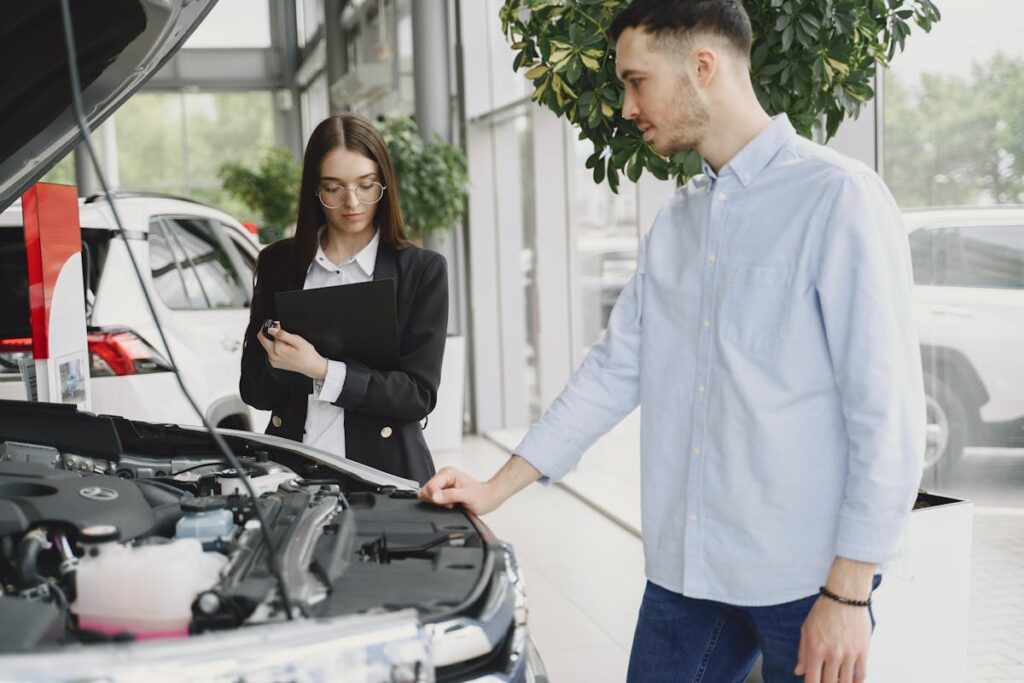Purchasing a used car from a private seller can be a formidable task, fraught with potential pitfalls and complications. It requires careful planning, meticulous research, and prudent negotiation skills. While this process might seem challenging, understanding the basic steps can save you considerable time, money, and stress. This discussion will meticulously dissect and explain these steps, providing you with the essential knowledge to make an informed decision. The question then remains, are you prepared to navigate the intricacies of this process?
Establish Your Budget
Before diving headfirst into the vast ocean of used cars, it’s crucial to establish your budget. This undertaking demands a thorough understanding of your financial capacity and careful consideration of various financing options. Remember, the price tag of a used car is not the only factor to take into account; insurance considerations also play a considerable role.
Your budget should reflect a realistic assessment of what you can afford monthly for your car payment, insurance, maintenance, and fuel. If you’re considering financing options, make sure to factor in interest rates and the length of the loan. A lower monthly payment may seem attractive, but if it’s spread over a longer period, you may end up paying more in the long run.
Insurance considerations are also paramount. Used cars can often be cheaper to insure, but factors such as the car’s age, model, and safety features can greatly impact the insurance premium. Always get an insurance quote before finalizing the purchase.
Establishing a detailed and realistic budget is the first step in maneuvering the used car market effectively and making a purchase that aligns with your financial capabilities and needs.
Determining Your Vehicle Needs
In tandem with budgeting, it’s essential to clearly determine your vehicle needs. Thoroughly understanding your requirements helps in narrowing down the pool of available options, saving you time, money, and potential disappointment.
Consider your daily driving habits. If you have a long commute or take frequent road trips, fuel efficiency should be a top priority. A car with high fuel efficiency can save you a substantial amount in the long run, despite a potentially higher upfront cost. Conversely, if you drive less frequently or over shorter distances, a less fuel-efficient vehicle might suit your needs.
Don’t overlook the importance of insurance costs when determining your vehicle requirements. Different types of cars come with different insurance rates. For instance, sports cars generally have higher insurance costs compared to sedans or hatchbacks. Additionally, used cars can also have lower insurance costs than new ones. Consequently, it’s essential to factor in these potential expenses when deciding on your ideal car.
Lastly, think about your space needs. Families will require more seating and storage space than singles or couples. By identifying your vehicle needs upfront, you’ll be better equipped to make an informed, cost-effective decision when buying a used car.
Researching Prospective Sellers
As we progress in the car buying process, the importance of researching prospective sellers becomes paramount. A critical understanding of the seller’s credibility, the legal implications of the purchase, and the condition of the car will greatly influence the success of the transaction. Therefore, these factors demand meticulous examination to guarantee a beneficial, risk-free, and legally sound decision.
Evaluating Seller’s Credibility
Purchasing a used car involves a significant investment and requires due diligence. A critical part of this process is evaluating the seller’s credibility to guarantee you’re not falling prey to fraud or deception. To begin this process, consider the seller’s online presence. If the seller has a website or social media profiles, take time to peruse them and gain a sense of their reputation.
Seller reviews are an invaluable resource in this process. They can provide insight into the seller’s history, their integrity, and their approach to business. Be wary of sellers with multiple negative reviews or a lack of online presence, as this could be a red flag.
Next, engage the seller in a detailed discussion about the car’s history. A credible seller will be transparent, providing thorough details about the vehicle’s past, including any accidents, repairs, and maintenance. If the seller is evasive or vague, consider it a potential warning sign.
Understanding Legal Implications
Steering through the legal landscape of buying a used car involves a keen understanding of your rights and responsibilities as a buyer. It is essential to be aware of the legalities involved, mainly concerning the title transfer and guaranteeing adequate liability coverage.
The title transfer is a pivotal legal procedure that marks the official change of vehicle ownership. It involves signing the car’s title over to you, the buyer, from the seller. A proper title transfer process guarantees that you’re legally recognized as the car’s new owner. If not done correctly, it can lead to unnecessary complications and potential legal disputes.
Liability coverage is another significant aspect of the car buying process. It’s the minimum auto insurance coverage required by most states. As a car owner, you’re legally obligated to obtain liability coverage for your vehicle. Its purpose is to financially protect you if you’re held responsible for injuries or damages to another person or their property during an accident.
Make sure you familiarize yourself with the legal implications to avoid pitfalls that can turn your car buying experience into a nightmare. Understanding these elements is not just a legal requirement but a responsibility that guarantees your peace of mind.
Assessing Car’s Condition
Maneuvering the marketplace of used vehicles demands a thorough assessment of the car’s condition. An essential step in this procedure is test driving. This experience provides an unfiltered glimpse into the vehicle’s real-time performance, allowing you to observe any unusual noises, vibrations, or issues in handling. It is recommended to test drive in various conditions – including highways, city streets, and hilly areas – to evaluate the car’s response accordingly.
However, a test drive alone may not reveal all potential problems. Hence, a professional inspection is crucial. A trained mechanic can spot underlying issues that could lead to expensive repairs down the line. They can assess the engine, brakes, transmission, and other important components, providing a detailed report on the vehicle’s overall health.

Inspecting the Car Thoroughly
Before sealing the deal, a thorough inspection of the used car is vital to confirm you’re making a wise investment. This involves an exterior inspection and a test drive, which should not be overlooked as they can reveal potential issues.
During the exterior inspection, pay attention to the car’s bodywork. Look for signs of rust, dents, and scratches. Inspect the tires for wear and tear, and don’t forget to check the lights. Remember, minor aesthetic issues might be fixable, but more significant exterior damage could indicate more severe, hidden problems.
Next, arrange for an all-encompassing test drive. This will not only give you an idea about the vehicle’s performance but can also expose any hidden faults. It’s critical to listen for any unusual noises and observe how the car responds to different driving conditions. Be attentive to the car’s braking, steering, and transmission.
This detailed inspection will help ascertain that the used car you’re considering is worth the investment. It’s a key step in buying a used car from a private seller, and skipping it could lead to regrettable decisions. Be meticulous, be observant, and let the car prove its worth to you.
Requesting Maintenance Records
Understanding the vehicle’s history is essential when purchasing a used car. Maintenance records provide an invaluable insight into the car’s past, showcasing a chronological account of repairs and servicing. Ensuring these logs are thorough and consistent can greatly impact your decision, painting an accurate picture of the car’s health and longevity.
Assessing Vehicle’s History
A vehicle’s maintenance history, an invaluable roadmap to its past, is an integral part of the used car buying process. This history provides insight into the car’s overall health and longevity, revealing issues that might not be evident through a visual inspection or test drive. In this situation, obtaining a thorough vehicle history is vital.
Car reports, available from various online services, provide a wealth of information including ownership history, past accidents, and previous repairs. The depth of knowledge these reports provide can greatly influence your decision to proceed with the purchase or continue your search. However, while these reports are extremely useful, they should not replace a thorough inspection by a trusted mechanic.
It’s essential to note that a clean vehicle history doesn’t guarantee a problem-free purchase. Some issues may not be reported, or the vehicle could have been poorly maintained. For this reason, requesting maintenance records from the seller is a wise step. These records, if provided, can offer a more detailed picture of the car’s past, including routine maintenance and minor repairs.
Importance of Repair Logs
Nearly all seasoned car buyers will agree that acquiring a vehicle’s maintenance records greatly enhances the buyer’s understanding of the car’s history. These documents, also known as repair logs, offer a detailed account of all the maintenance work done on the vehicle. They can also provide valuable insight into the car’s current condition and future performance.
One of the key repair log benefits is that they can help you avoid buying a car with hidden problems. If the maintenance documentation shows consistent and timely servicing, it is a strong indication that the car has been well-cared for. On the other hand, missing or irregular entries may suggest potential issues or neglect.
Furthermore, a thorough repair log can assist in predicting future maintenance costs. By examining past repairs and services, you can anticipate what might need attention next. This could save you from unexpected repair costs down the line.
Negotiating the Price
How can you guarantee you’re getting the best deal when buying a used car? The answer lies in two key aspects: diligent price comparison and effective negotiation tactics.
Price comparison is a vital first step. Research similar models and makes, focusing on factors such as mileage, year, and condition. Online tools and websites can guide your comparative analysis, presenting a spectrum of prices to help determine a reasonable range. Understand the market value of the car you’re interested in and use this information as a benchmark during negotiations.
Negotiation tactics are an indispensable part of the process. Remember, the asking price is just a starting point, not a final figure. Be prepared to haggle, but do so respectfully. Convey your knowledge about the car’s value and substantiate your counter-offers with your research findings. However, don’t let emotions rule; be ready to walk away if the price doesn’t meet your budget or if the seller refuses to negotiate.
Finalizing the Purchase
Once negotiations have concluded favorably, the journey towards car ownership edges closer to completion. At this stage, a buyer’s focus should pivot towards finalizing the purchase, a process that involves securing a suitable payment method and handling transfer paperwork.
Firstly, consider the different payment methods available. Cash is often the most straightforward option, but for higher-priced vehicles, a cashier’s check, a money order, or a personal check might be more convenient. Whichever route you choose, make certain that the transaction is documented for future reference.
Next, the all-important transfer paperwork needs to be completed. This typically includes the vehicle title, which should be signed by both parties to legally transfer ownership. In addition, a bill of sale detailing the purchase price, vehicle condition, and other relevant information should be drawn up. It is vital to verify all details on these documents are accurate to avoid future complications.

